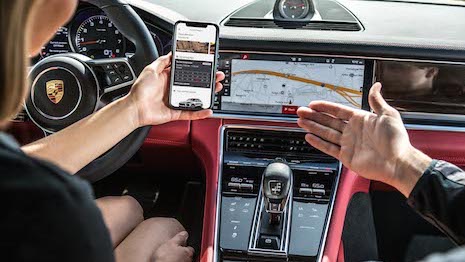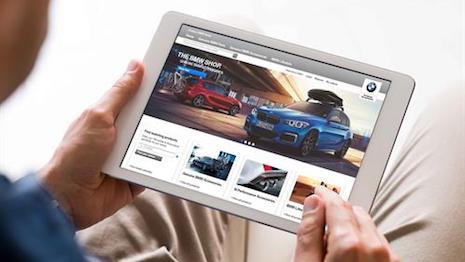 Porsche, which ranked first in sales satisfaction, has made a number of recent digital moves. Image credit: Porsche
Porsche, which ranked first in sales satisfaction, has made a number of recent digital moves. Image credit: Porsche
Even though 90 percent of car buyers still visit a physical dealership at some point in their purchase journey, the retailer’s Web site can have a significant impact on whether or not customers choose to buy from it.
About a quarter of consumers who consider buying from a dealer without transacting chose to move on before engaging with sales staff at the showroom, with many making their choice based on the dealership’s online presence. A new report from J.D. Power finds that moving shoppers through to a sale often starts with digital engagement.
"While only 10 percent of the customers primarily interact online, we expect that number to grow," said Chris Sutton, vice president of automotive retail at J.D. Power. "As the dealer Web site is where most customers would have their first look at inventory, pricing and promotions, it’s the dealership first impression for many customers.
J.D. Power’s 2019 U.S. Sales Satisfaction Index study is based on a survey of almost 29,000 buyers who purchased their car between April and May. The report looks at both those who bought with a dealership and those who eventually went with another dealership, which the report calls “rejecters.”
First impression
The majority of consumers make their choice about whether to buy from a particular dealer early in the process. Less than half of car shoppers who reject a dealership reach the negotiation phase.
While human interactions are still important, technology has an impact on shopper satisfaction. Compared to dealers who use no devices, those who use at least one have satisfaction scores that are on average 45 points higher.
Technology touches can include the buyer’s or dealer’s smartphones, but the most impactful digital devices are tablets and touchscreen monitors.
 About a quarter of consumers make decisions on what dealer to buy from based on online channels. Image credit: BMW
Luxury dealerships are slightly more likely than those selling mass-market marques to use technology, but 36 percent of luxury shoppers noted that their dealers did not use any digital devices during the process.
The way that dealers communicate with prospects is also digitizing, with 4 percent more using text messaging to interact with clients compared to last year. SMS interactions can boost satisfaction scores by about 11 points.
"Tablets can help communicate product features and benefits while tech tools may enable the dealership sales consultant to sit with the customers and access information together," Mr. Sutton said. "This is a great way for the dealership to establish themselves as a trusted resource."
In addition to technology, dealerships should think about their delivery experience.
Car sellers have been offering buyers more options such as dropping off their vehicle to a home or office. While enabling flexibility, these interactions are often not rated as satisfactory by consumers, and it can make a 27 point difference for luxury brands.
To keep satisfaction up, dealers should focus on explaining the technology and features of buyers’ cars at point of delivery, regardless of location. For instance, dealers show consumers how to use their car’s safety technology about 82 percent of the time when they pick it up at the showroom, but only 69 percent when it is dropped off to their house or office.
Luxury leaders
Luxury dealerships have a much wider gap in satisfaction scores than those for mass-market brands. Among luxury retailers with lower closing rates, satisfaction for their Web site is 35 points lower than average, and facility scores have 73 fewer points.
Rejecters rate brands’ facilities 51 points below average.
At the top of the luxury rankings for the second year in a row was Porsche, which led with a score of 827 out of 1,000. In second place was Mercedes-Benz, followed by Infiniti.
Earlier this year, Porsche rolled out a new approach to dealerships as more brands are focusing on brand experiences in the physical retail space.
The first “Destination Porsche” concept dealership is opened in Palm Springs, CA. Moving forward, Porsche Centres will be viewed as a community gathering place for new and current customers, with an added emphasis on digital media that can individualize communication (see story).
Porsche also recently launched online sales in the U.S. in partnership with its dealer network (see story).
As ecommerce continues to see exponential growth, luxury automakers need to adapt and leverage digital tools to improve the customer experience.
Affluents are growing more accustomed to online research and ecommerce, and automakers continue to experiment with ways to add more digital communications into the shopping journey. While offline, onsite car purchases will not be disappearing anytime soon, consumer preferences are changing fast enough that luxury marques risk falling behind by not introducing more ecommerce options (see story).
"In addition to a steady improvement in market share as they introduce new models, Porsche has consistently placed priority on the customer experience," Mr. Sutton said. "That consistency and executive leadership has been critical to their customer experience performance."
About a quarter of consumers make decisions on what dealer to buy from based on online channels. Image credit: BMW
Luxury dealerships are slightly more likely than those selling mass-market marques to use technology, but 36 percent of luxury shoppers noted that their dealers did not use any digital devices during the process.
The way that dealers communicate with prospects is also digitizing, with 4 percent more using text messaging to interact with clients compared to last year. SMS interactions can boost satisfaction scores by about 11 points.
"Tablets can help communicate product features and benefits while tech tools may enable the dealership sales consultant to sit with the customers and access information together," Mr. Sutton said. "This is a great way for the dealership to establish themselves as a trusted resource."
In addition to technology, dealerships should think about their delivery experience.
Car sellers have been offering buyers more options such as dropping off their vehicle to a home or office. While enabling flexibility, these interactions are often not rated as satisfactory by consumers, and it can make a 27 point difference for luxury brands.
To keep satisfaction up, dealers should focus on explaining the technology and features of buyers’ cars at point of delivery, regardless of location. For instance, dealers show consumers how to use their car’s safety technology about 82 percent of the time when they pick it up at the showroom, but only 69 percent when it is dropped off to their house or office.
Luxury leaders
Luxury dealerships have a much wider gap in satisfaction scores than those for mass-market brands. Among luxury retailers with lower closing rates, satisfaction for their Web site is 35 points lower than average, and facility scores have 73 fewer points.
Rejecters rate brands’ facilities 51 points below average.
At the top of the luxury rankings for the second year in a row was Porsche, which led with a score of 827 out of 1,000. In second place was Mercedes-Benz, followed by Infiniti.
Earlier this year, Porsche rolled out a new approach to dealerships as more brands are focusing on brand experiences in the physical retail space.
The first “Destination Porsche” concept dealership is opened in Palm Springs, CA. Moving forward, Porsche Centres will be viewed as a community gathering place for new and current customers, with an added emphasis on digital media that can individualize communication (see story).
Porsche also recently launched online sales in the U.S. in partnership with its dealer network (see story).
As ecommerce continues to see exponential growth, luxury automakers need to adapt and leverage digital tools to improve the customer experience.
Affluents are growing more accustomed to online research and ecommerce, and automakers continue to experiment with ways to add more digital communications into the shopping journey. While offline, onsite car purchases will not be disappearing anytime soon, consumer preferences are changing fast enough that luxury marques risk falling behind by not introducing more ecommerce options (see story).
"In addition to a steady improvement in market share as they introduce new models, Porsche has consistently placed priority on the customer experience," Mr. Sutton said. "That consistency and executive leadership has been critical to their customer experience performance."
